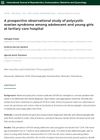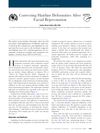 2 citations,
January 1970 in “Asian journal of pharmaceutical research and development”
2 citations,
January 1970 in “Asian journal of pharmaceutical research and development” PCOS is a hormonal disorder affecting many women, leading to symptoms like acne and irregular periods, and increasing the risk of diabetes and heart disease.
 December 2022 in “International journal of preventive, curative & community medicine”
December 2022 in “International journal of preventive, curative & community medicine” PCOS is a common hormonal disorder in women, causing symptoms like acne and irregular periods, and is managed with medication and lifestyle changes.
 December 2022 in “International Journal of Current Science Research and Review”
December 2022 in “International Journal of Current Science Research and Review” Polycystic Ovary Syndrome (PCOS) is a common but often undiagnosed disorder in women that can cause irregular periods, infertility, and other symptoms, and can be managed with lifestyle changes, medication, and sometimes surgery.
 August 2022 in “International journal of reproduction, contraception, obstetrics and gynecology”
August 2022 in “International journal of reproduction, contraception, obstetrics and gynecology” The study found that 7.21% of young girls have polycystic ovarian syndrome, with symptoms like irregular periods, abnormal hair growth, and acne. Early diagnosis is important to prevent long-term complications.

Many young women have Polycystic Ovarian Syndrome (PCOS), which is often linked with irregular periods, depression, low self-esteem, and insomnia. Lifestyle and diet changes, along with regular counseling, can help manage these symptoms.
 October 2010 in “Reproductive Biomedicine Online”
October 2010 in “Reproductive Biomedicine Online” Women with pituitary adenomas often have reproductive issues, like irregular periods and trouble getting pregnant, but not always breast milk production without pregnancy.
 49 citations,
May 2018 in “Endocrine”
49 citations,
May 2018 in “Endocrine” Women with regular menstrual cycles and PCOS have linked kisspeptin and LH hormone patterns, unlike those with irregular cycles.
 9 citations,
March 2022 in “Frontiers in Endocrinology”
9 citations,
March 2022 in “Frontiers in Endocrinology” About 19.4% of Iranian women in the study have Polycystic Ovary Syndrome, with the most common type involving irregular periods and high male hormone levels, but their heart and metabolic health is similar to women without the condition.
 3 citations,
March 2020 in “Dermatology Research and Practice”
3 citations,
March 2020 in “Dermatology Research and Practice” Tracnil™, a mix of myo-inositol, folic acid, and vitamin D3, safely reduced acne, improved excessive hair growth, and fixed irregular periods in overweight women with PCOS.
 August 2023 in “International journal of reproduction, contraception, obstetrics and gynecology”
August 2023 in “International journal of reproduction, contraception, obstetrics and gynecology” PCOS is common in young women, especially those aged 21-30, and often involves symptoms like irregular periods, weight gain, and acne.
 April 2023 in “Elsevier eBooks”
April 2023 in “Elsevier eBooks” PCOS is a hormonal disorder causing symptoms like excess hair, acne, irregular periods, and fertility issues.

Polycystic ovary syndrome (PCOS) affects about 10% of women, is often linked to obesity and family history, and can cause irregular periods, fertility issues, and other symptoms. It's usually managed with lifestyle changes, weight loss, and medication.
July 2020 in “International journal of clinical & experimental dermatology” Hair loss in women aged 20-30 is often linked to deficiencies in Vitamin D, zinc, ferritin, and haemoglobin, as well as low SHBG levels in those with irregular periods.
163 citations,
October 2001 in “EMBO journal” Overexpressing follistatin in mice delays wound healing and reduces scar size.
 99 citations,
August 2003 in “Fertility and Sterility”
99 citations,
August 2003 in “Fertility and Sterility” Too much male hormone is the main cause of Polycystic Ovary Syndrome.
 50 citations,
February 2007 in “Clinical obstetrics and gynecology”
50 citations,
February 2007 in “Clinical obstetrics and gynecology” Early detection and treatment of PCOS in teenagers is important to manage symptoms and prevent severe issues.
 48 citations,
April 2015 in “PLOS ONE”
48 citations,
April 2015 in “PLOS ONE” Excessive hair growth affects the quality of life of Iranian women with PCOS the most.
37 citations,
September 2002 in “Acta pædiatrica” A cystic fibrosis patient developed Cushing's syndrome from a drug interaction between itraconazole and budesonide, which improved after stopping the medications.
 34 citations,
July 2011 in “Journal of the European Academy of Dermatology and Venereology”
34 citations,
July 2011 in “Journal of the European Academy of Dermatology and Venereology” The study concluded that scalp tumors show different patterns based on age, gender, and tumor thickness, and emphasized the importance of early detection and scalp examinations.
26 citations,
June 2003 in “Obstetrics and gynecology clinics of North America” More research is needed to understand the long-term benefits of insulin-sensitizing drugs for treating adolescents with PCOS.
 24 citations,
November 2016 in “Molecular Medicine Reports”
24 citations,
November 2016 in “Molecular Medicine Reports” Hormonal imbalances, often indicating conditions like PCOS, are common in women with hard-to-treat acne, and a treatment approach addressing these imbalances may be needed.
 18 citations,
April 2016 in “Endocrinology and Metabolism Clinics of North America”
18 citations,
April 2016 in “Endocrinology and Metabolism Clinics of North America” The document concludes that diagnosing PCOS in teenagers is difficult and should focus on specific hormone levels and menstrual irregularities, while also considering treatment for symptoms and related health issues.
 16 citations,
March 2014 in “Journal of the European Academy of Dermatology and Venereology”
16 citations,
March 2014 in “Journal of the European Academy of Dermatology and Venereology” Korean patients with PCOS often have skin problems like acne and excess hair, with different symptoms based on their specific PCOS type.
12 citations,
February 1986 in “PubMed” Injecting newborn mice with a niacin blocker caused skin, gut, and brain damage similar to human pellagra.
 10 citations,
January 2004 in “KARGER eBooks”
10 citations,
January 2004 in “KARGER eBooks” Diagnosing PCOS in teenage girls is tricky and requires careful evaluation and management.
 7 citations,
August 2000 in “Journal of Pediatric and Adolescent Gynecology”
7 citations,
August 2000 in “Journal of Pediatric and Adolescent Gynecology” To improve use of the contraceptive DMPA among adolescents, effectively manage side effects like menstrual changes and weight gain through counseling and guidance.
 6 citations,
July 2007 in “Aesthetic Surgery Journal”
6 citations,
July 2007 in “Aesthetic Surgery Journal” The document concludes that using autologous follicular unit implantation is a successful method to correct hairline deformities after facial rejuvenation.
6 citations,
September 2002 in “Acta pædiatrica” A cystic fibrosis patient developed Cushing's syndrome from a drug interaction between itraconazole and inhaled budesonide.
5 citations,
March 2013 in “BMJ case reports” Gastric bypass surgery improved a woman's hormonal disorder without the need for medication.
 4 citations,
December 2022 in “Frontiers in Endocrinology”
4 citations,
December 2022 in “Frontiers in Endocrinology” Treating non-classic congenital adrenal hyperplasia is complex because the benefits of hormone treatment must be weighed against potential health risks.























